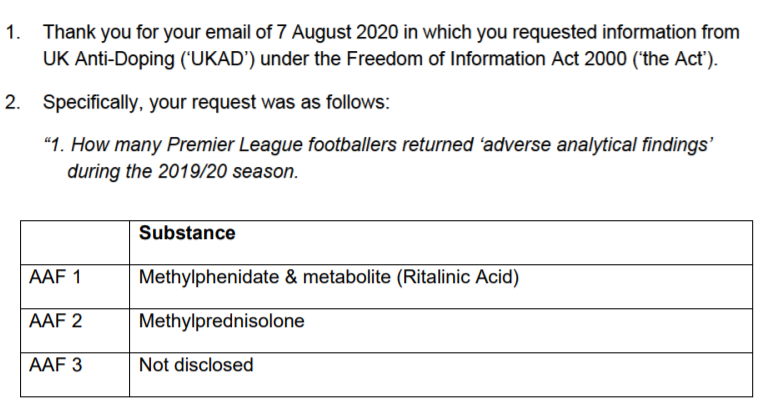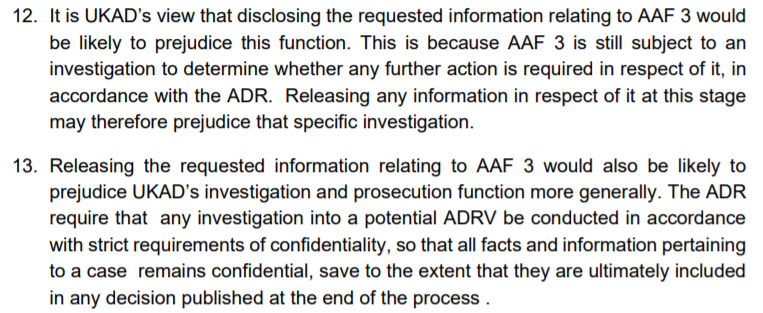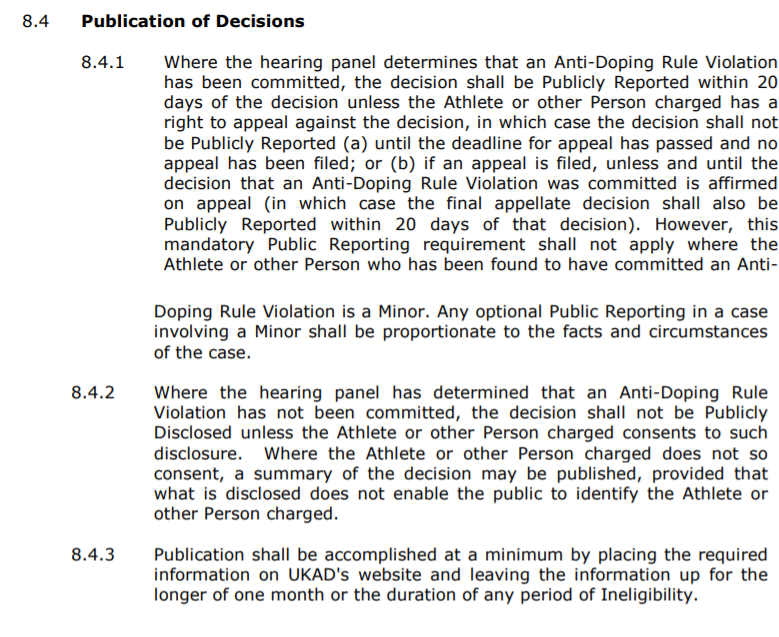UK Anti-Doping is currently managing the doping case of a Premier League footballer from last season.
This information arose after someone, not me, according to the UKAD website, submitted an FOI asking how many Adverse Analytical Findings there were in the 2019/2020 season.
1/
This information arose after someone, not me, according to the UKAD website, submitted an FOI asking how many Adverse Analytical Findings there were in the 2019/2020 season.
1/
We know this, because in the case of AAF 3, UKAD refused to disclose which substance the Premier league footballer had tested positive for because the investigation, as of 13th October, was ongoing.
2/
2/
An AAF leads to a doping charge from UKAD if it has been established the athlete was not in possession of a medical exemption to take the banned substance and if there were no departures from the international standard for testing.
3/
3/
Given the Premier League season ended on 26th July, at the time of the FOI, it means UKAD had still failed to establish, in 3 months, whether the Premier League footballer should be charged with a doping violation.
Or perhaps he has already been charged.
4/
Or perhaps he has already been charged.
4/
There is no way of us knowing because there is little transparency in the way UKAD manages cases.
If you are charged with a doping violation and provisionally suspended UKAD are not bound to announce it publicly.
5/
If you are charged with a doping violation and provisionally suspended UKAD are not bound to announce it publicly.
5/
If you are found guilty of a doping violation during a tribunal, your punishment will not be announced publicly if you appeal the decision.
If you win the appeal, and are totally cleared, the public never finds out.
6/
If you win the appeal, and are totally cleared, the public never finds out.
6/
The Athletics Integrity Unit has taken the active decision to be more transparent. They announce provisional suspensions publicly. The International Tennis Federation even acts with more transparency now after years of damaging rumours of 'silent bans'.
7/
7/
While UKAD's lack of transparency is non-ideal, it must be noted that in order to adopt similar transparency laws to private international federations, UKAD would have to make amendments to the UK's anti-doping laws.....which is much more difficult.
8/
8/
UKAD was established in 2009, and it will be interesting to see if its new laws offer better transparency when/if amendments are made to keep in line with the new WADA 2021 code.
In the meantime we are left wondering which big cases have we not known about over the years.
9/
In the meantime we are left wondering which big cases have we not known about over the years.
9/
None more so than in the case of the boxer Dillian Whyte.
In 2019, he tested positive for the most serious of steroids Dianabol - after he had already been banned in 2012.
10/
In 2019, he tested positive for the most serious of steroids Dianabol - after he had already been banned in 2012.
10/
UKAD charged him with an anti-doping rule violation.
However, they accepted his defence and withdrew the charge entirely - no public warning, no ban. We therefore have no idea what his explanation was as to why a bodybuilding steroid was found in his system.
11/
However, they accepted his defence and withdrew the charge entirely - no public warning, no ban. We therefore have no idea what his explanation was as to why a bodybuilding steroid was found in his system.
11/
All non-ideal.
Either way, the Premier league footballer will either be banned or UKAD will be bound to disclose which substance was involved as the investigation will be over.
End/
Either way, the Premier league footballer will either be banned or UKAD will be bound to disclose which substance was involved as the investigation will be over.
End/

 Read on Twitter
Read on Twitter





